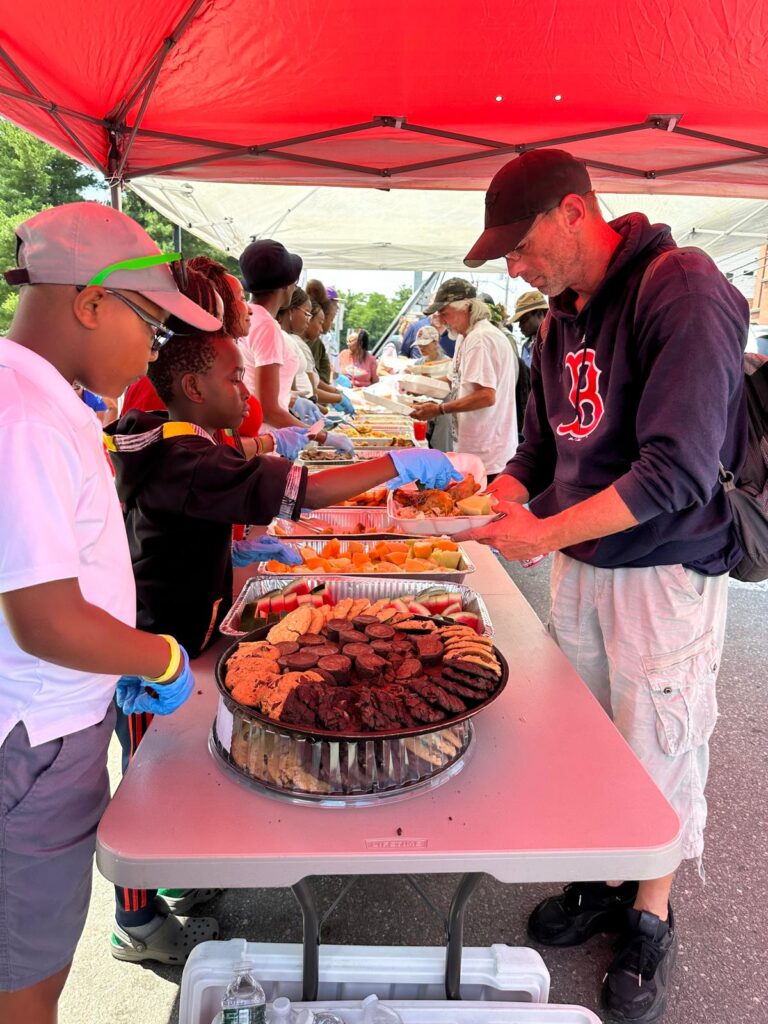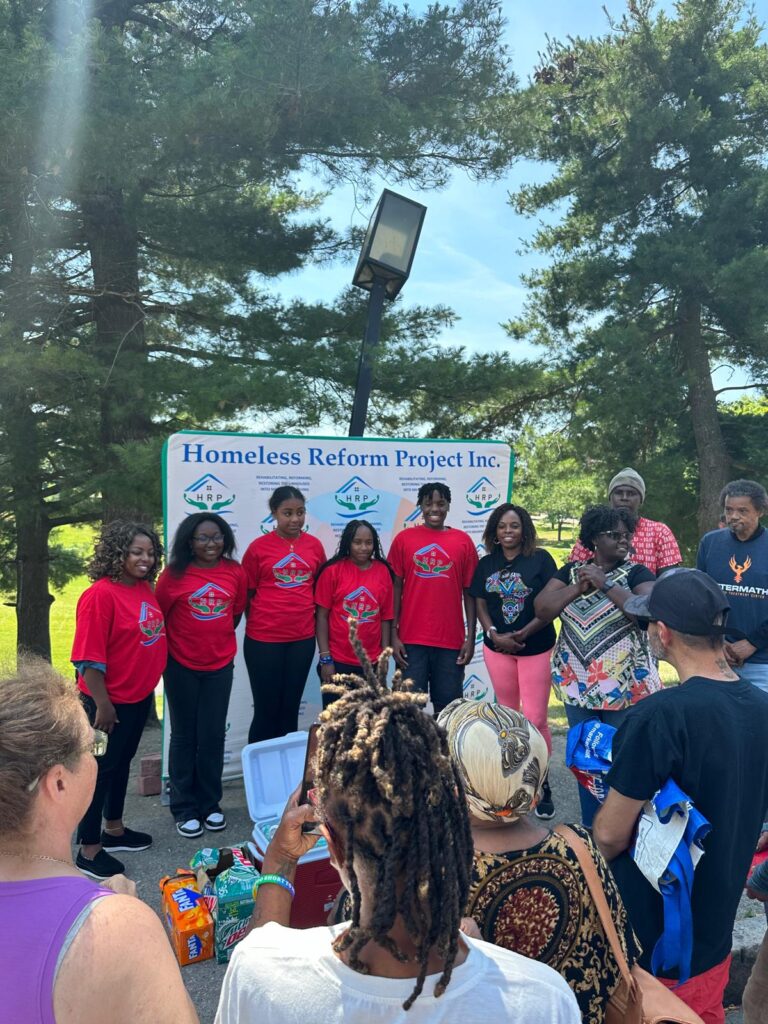Our Priorites
HRP Programs
Mondays at the park
We provide sponsored hot lunches to individuals experiencing homelessness every Monday and on Public holidays.
Clothing the Homeless
Providing clothing, shoes, blankets and toiletries periodically to families and individuals experiencing homelessness
Mental Health For the Homeless
Connecting client’s with mental health providers, provide transportation and accompany them to appointments with mental health providers as needed.
Drug Addiction Help
Assisting individuals struggling with addiction to access treatment in local addiction treatment/rehabilitation centers and sober homes.
Homelessness Support
Assisting families and individuals experiencing homelessness with payment for move-in costs and rent
Housing Support
Assisting families and individuals with applications for affordable and subsidized housing opportunities/ connecting them to local landlords.
About 18% of homeless individuals are children under 18 and 30% of are families with children.
As HRP is dedicated to supporting the homeless population in the United States, we are committed to addressing the complex challenges faced by individuals and families experiencing homelessness. Our comprehensive programs aim to provide essential services and support to help people regain stability and work towards self-sufficiency. Here’s a detailed report on our work and the state of homelessness in the USA:




Food for the Homeless
Together, we can reduce the food hunger.
Our food assistance program is a cornerstone of our efforts to support individuals experiencing homelessness. We believe that access to nutritious meals is a fundamental right and a crucial step in helping people maintain their health and well-being.
- In 2023, approximately 38 million Americans faced food insecurity.
- Among homeless individuals, an estimated 85% report not having enough food to eat.
- 1 in 6 children in the US lives in a food-insecure household.
Our food program includes:
a) Soup kitchens: We operate soup kitchens On Mondays, serving over 100 hot meals.
b) Mobile food trucks: We partner with mobile food trucks to reach underserved areas and homeless encampments, providing nutritious meals to those who can’t access traditional soup kitchens.
c) Food pantries: We are planning to partner with owners of food pantries to help us improve the distribution of non-perishable items and fresh produce to families and individuals at risk of homelessness.
d) Nutrition education: We offer workshops on healthy eating on a budget, teaching valuable skills to those transitioning out of homelessness.
Clothes for the Homeless
Proper clothing is essential for dignity, protection from the elements, and improving chances of employment. Our clothing program aims to provide clean, well-fitting clothes to those in need.
Key statistics:
- Approximately 60% of homeless individuals report inadequate clothing for weather conditions.
- Lack of proper attire is cited as a barrier to employment by 40% of homeless job seekers.
Our clothing program includes:
a) Clothing banks: We partner with institutions like churches to seek clothing support and with clothing banks that offer a wide range of sizes and styles for men, women, and children.
b) Mobile clothing units: We plan on extending our clothing program by partnering with mobile units travel to homeless encampments and rural areas, bringing clothing directly to those in need.
Impact:
- In 2023, we distributed over one hundred thousand items to homeless individuals.
- Our clothes program helped thousands of homeless individuals regain dignity and sense of belonging.
Mental Health for the Homeless
Mental health issues are both a cause and consequence of homelessness. Our mental health program aims to provide crucial support and treatment to those struggling with mental illness.
Key statistics:
- An estimated 25% of homeless individuals in the US have a serious mental illness.
- 45% of homeless individuals report having mental health problems.
- Only about 30% of homeless individuals with mental illness receive any form of treatment.
Our mental health program includes:
a) Street outreach: Our team of 100 mental health professionals conducts regular outreach to engage homeless individuals and provide on-the-spot assessments and referrals.
b) Counseling services: We offer free individual and group therapy sessions at our 30 mental health clinics nationwide.
c) Medication management: We provide assistance in obtaining and managing prescription medications for mental health conditions.
d) Crisis intervention: Our 24/7 hotline offers immediate support for mental health crises among the homeless population.
Impact:
- In 2023, we provided mental health services to over 50,000 homeless individuals.
- Our crisis intervention hotline handled 25,000 calls, potentially saving lives and preventing hospitalizations.
Drug Addiction Prevention and Support
Substance abuse is closely linked to homelessness, often serving as both a cause and a consequence. Our addiction prevention and support program aims to break this cycle.
Key statistics:
- Approximately 38% of homeless individuals are dependent on alcohol.
- About 26% of homeless individuals report regular use of illicit drugs.
- Only 17% of homeless individuals with substance use disorders receive treatment.
Our addiction prevention and support program includes:
a) Detoxification services: We operate 20 detox centers that provide medically supervised withdrawal management.
b) Rehabilitation programs: Our 15 residential rehab facilities offer long-term treatment and support for those battling addiction.
c) Outpatient counseling: We provide ongoing support through individual and group therapy sessions at 50 locations nationwide.
d) Harm reduction: Our needle exchange programs and safe consumption sites aim to reduce the risks associated with drug use while encouraging treatment.
Impact:
- In 2023, we helped 10,000 individuals enter addiction treatment programs.
- Our harm reduction initiatives reached 30,000 people, potentially preventing overdoses and the spread of infectious diseases.

Together, we can reduce homelessness.
Our homelessness support program is designed to provide immediate relief and long-term solutions for individuals and families experiencing homelessness.
Key statistics:
- On any given night in 2023, over 580,000 people experienced homelessness in the United States.
- Approximately 35% of homeless individuals are part of families with children.
- Veterans make up about 13% of the adult homeless population.
Impact:
- In 2023, we provided emergency shelter to over 100 individuals.
- Our rapid rehousing program helped 5,000 families move into stable housing.
- We prevented 20 evictions through our financial assistance and mediation services.
Comprehensive Analysis of Homelessness in the United States





